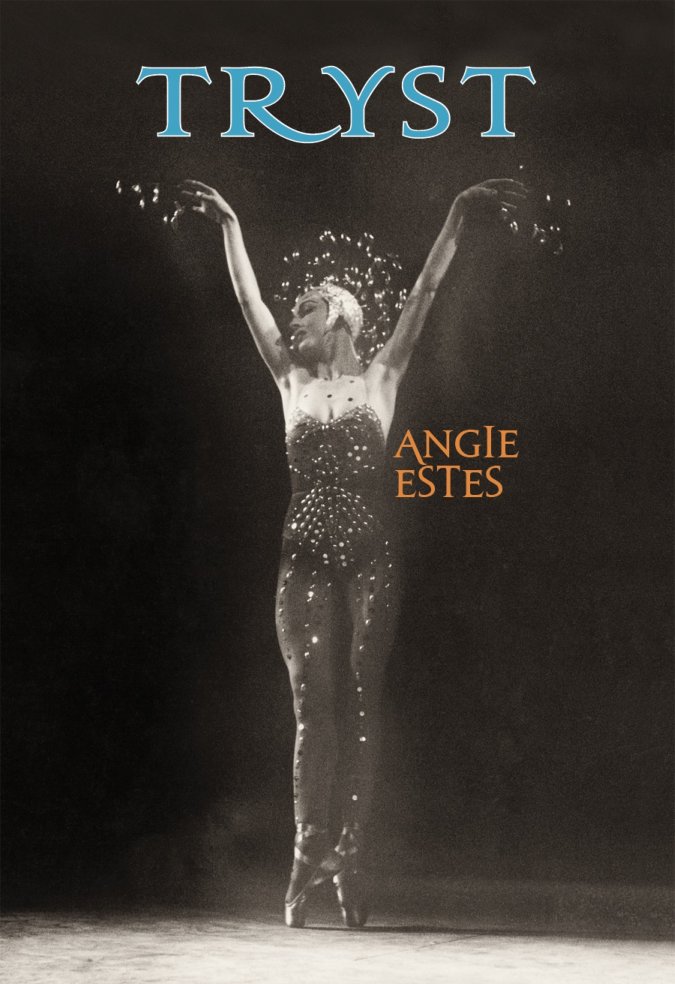Tryst was selected as one of two finalists for the 2010 Pulitzer Prize for Poetry.
"Whenever I see a poem by Angie Estes I prepare myself for serious delight. Who else can move so effortlessly from an Appalachian cornfield to a medieval fresco and back again by way of Rita Hayworth and a couple of bilingual puns? Her timing and her ever-uninhibited instinct for poetic shape are the triumphs of a first-rate musical intelligence. Angie Estes is Fred Astaire and Ginger too: backwards in high heels, forward on rollerskates, never have classy and sexy been better matched."
—Linda Gregerson
Gleeful and gorgeous, delighted by puns and other wordplay (including words from French, Latin and Italian), Estes's fast-paced free verse, rich with internal rhyme, takes rightful pride in the beauties it flaunts and explains. Her fourth collection finds, for recurrent motifs, saints' lives, medieval manuscripts, gold leaf and the alphabet: "hearts bloom / out of Ds like lamb chop sleeves / in the script of the fifteenth-century / scribe"; in a gilded Book of Hours, "the letters / have fallen out of the words and lie / scattered on the ground." Each deft poem weaves together multiple topics—some art-historical, others autobiographical—through chains of homonyms and knotty analogies: "Take Cover" skates from the French "couvre feu, cover the fire" (the origin for our word "curfew") to disheveled bedcovers and 1950s-style duck-and-cover drills. Though Estes revels in European reference (Dante, Trieste, Greta Garbo), her matchless hunger for experience makes her indelibly American: "how the tongue / keeps lapping the world’s / loot," she exclaims, "even in the 499th lap / of the Indy 500." The arts — from Cimabue’s painting to haute cuisine—are for Estes never mere luxuries; rather, the arts, and our pride in them, give us the only effective countermeasures to loneliness, helplessness and serious pain. And pain—remembered or feared—is always somewhere: "So Near Yet So Far" connects a lunar eclipse, a film starring Fred Astaire and Rita Hayworth, a concept from high-energy plasma physics and "the necklace / of pearls my father bought my mother / for their forty-fifth wedding / anniversary, which she made him / take back."
—Stephen (Stephanie) Burt, New York Times Book Review
Tryst, by Angie Estes (Oberlin College Press), [is] a collection of poems remarkable for its variety of subjects, array of genres and nimble use of language[.]
—Pulitzer Prize Jury, 2010
In her poem "Love Letters," Angie Estes writes, "I cover secrets, break me and read." And indeed, throughout Tryst, Estes' fourth and most personal collection, the poet gets straight to the heart of love, language, and memory. Details from the rural Appalachian lives of Estes' own family yield to meditations on '40s film stars, medieval saints, ancient Romans--and vice-versa. We learn that gold leaf is applied with a brush fashioned out of squirrel tail, Nijinsky invented a fountain pen he called God, and female prisoners of the concentration camp at Terezin composed recipes to be tasted only in memory: all part of the human passion to create, destroy, and above all, be known. Estes' tryst here is with history and the way it absorbs everything and everyone, leaving words, those most articulate of witnesses, behind. Like the Roman Forum with its dizzying strata of time exposed, Tryst is layered, sad, magnificent, and made memorable in and because of language. Break. Read.
